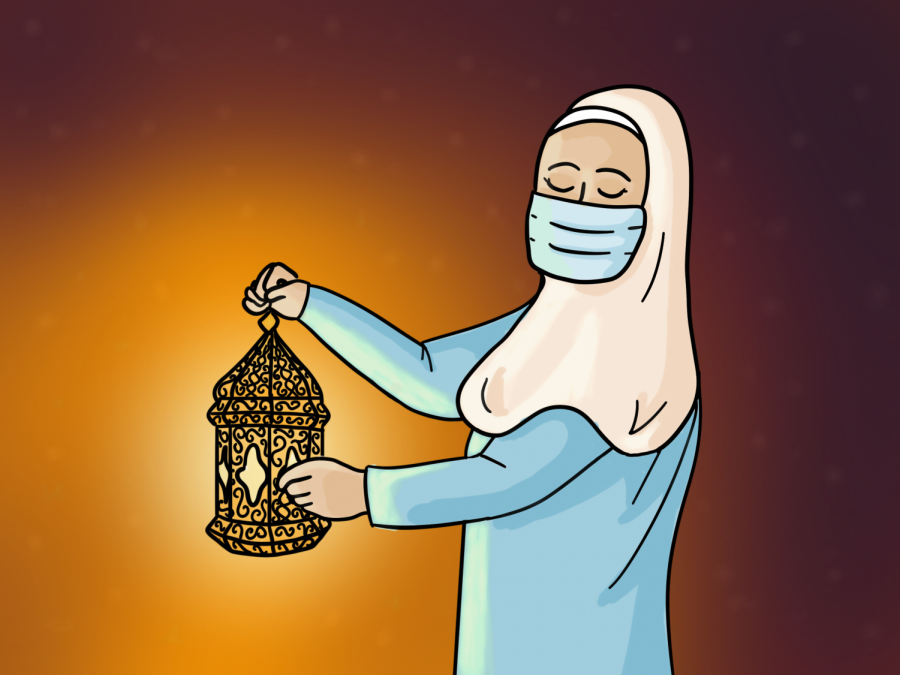SCHS students celebrate Ramadan during the pandemic
Muslim students at SCHS are grateful for the newfound sense of community during their second Ramadan in the pandemic.
Freshman Hibah Saleem enjoyed the Month of Ramadan, which ended May 12, 2021, and spent some of her time with her community and family at Taraweeh. Since last year’s COVID-19 shelter-in-place restrictions did not allow Ramadan celebrations in person, Saleem noticed the change in her community due to the absence of events.
Ramadan is a month where Muslims fast from dawn to sunset. During this month, numerous community prayers and gatherings take place.
As COVID-19 continues to spread and affect the SCHS community two years in a row, those who celebrated the month of Ramadan during the pandemic expressed their concerns. Muslim students at SCHS found positive and negative aspects that included coming together safely, scheduling around fasting, and the sense of togetherness in the month of Ramadan.
“Normally, it was a time where families would get together to have Iftar, breaking fast by eating at sunset,” Saleem said. “Last year, everyone was separated, and Ramadan was really different then what we’ve had. It was really lonely.”
Changes were made this year with safety protocols at Ramadan events. Saleem feels grateful for the opportunity to have events in person.
“Now, there’s social distancing, and everyone is wearing masks and bringing their own Janamaz’s (prayer mats),” Saleem said. “It’s definitely not something I’m used to, but it’s better than nothing.”
Freshman Khadijah Kamil had a safe experience attending one of the community held events in Ramadan known as Taraweeh, where attendees pray together.
“Some places are holding Taraweeh, but there is still social distancing and mask wearing,” Kamil said.“It was nice to be around other people who are the same as me again.”
Protocols while celebrating Ramadan this year made it difficult for those apart to meet in person, but they allowed those living together to connect even more, according to Kamil. She pointed out that connections are an important element of Ramadan.
“Ramadan is not only about improving yourself but also about being grateful and spending time with family and friends,” Kamil said. “Before COVID-19, there would be in-person school and work and other things that sort of kept us away from family for the most part during Ramadan.”
Sophomore Lamiha Rahman believes that fasting during the pandemic was easier than before.
“School usually makes fasting super hard. Not having to walk to each of my classes helps me save energy since I’m taking online classes,” Rahman said. “At home, I can pray more easily.”
Similarly, Kamil also experienced some benefits due to the pandemic. She feels those who participated in Ramadan this year received more sleep than usual since certain events were canceled.
“Because there (were) no night gatherings, we (were) able to get more sleep,” Kamil said. “Most of us wake up before sunrise to eat, and then sometimes go to prayers at night.”
Despite multiple positives about Ramadan this year, freshman Abdullahi Yusuf noted that community elements are lost due to the pandemic.
“Our local community used to give out Iftar, the breaking of the fast, and Suhoor, the meal eaten before we fast, to those who couldn’t afford it,” Yusuf said. “Now, those who are less fortunate don’t have that opportunity due to COVID.”
Similarly, senior Umar Waheed felt a sense of sorrow from the previous year.
“Last year, it was horrible not having any gatherings during Ramadan. I always look forward to them,” Waheed said. “It’s sad because you don’t get the full experience.”
After experiencing Ramadan, students hold onto their personal favorite parts of the holiday. One contemplated what Ramadan means to her.
“Ramadan for me, is a way to really push myself and also a month for me to reflect on how blessed I am,” Kamil said.
Rahman values the spiritual aspects of Ramadan and what it means to her as a Muslim.
“I love the bonding in Ramadan. Ramadan is a period of healing,” Rahman said. “Your connection with Allah strengthens.”
Despite certain events being cancelled due to the pandemic, which caused some to leave some traditions behind due to safety concerns, students remain hopeful for the possible future of their community and holiday.
“Our religion is so much about community, being generous and helping others, that the lack of social interaction is pretty hard,” Kamil said. “Hopefully, as things continue to get better, we will have a ‘normal’ Ramadan soon.”


